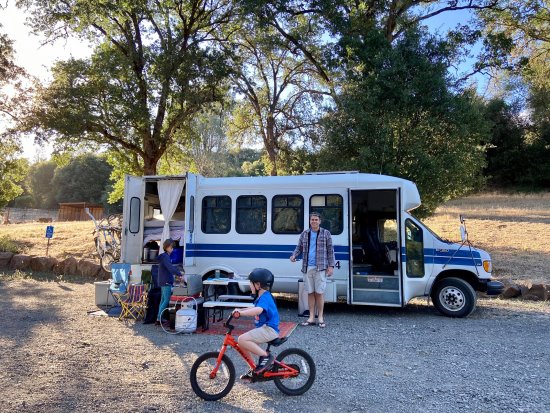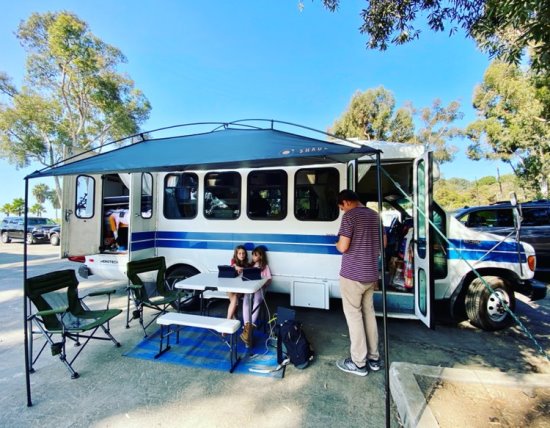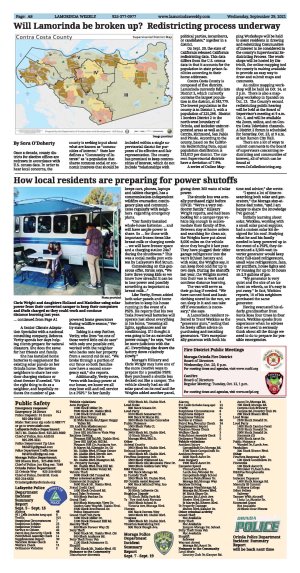| | Published September 29th, 2021
| How local residents are preparing for power shutoffs
| | | By Diane Claytor |  | | Chris Wright, with his son, Bruce (on bike), and daughter Madeline in front of their shuttle bus converted to a camper with 300 watts of solar power.? Photo provided |
It's likely not a question of if PG&E will shut off our power for safety reasons within the next few months, but a question of when. Between parched vegetation, low humidity and dry, hot winds, the threat of wildfires in our area is, unfortunately, a huge concern we all share.
 Most Lamorinda residents are prepared for a PG&E public safety power shutoff (PSPS). Dry brush and debris have been cleared, generators and back-up batteries have been purchased and go-bags are packed. But has your go-bag been updated? As one Lafayette resident realized, the diapers she packed last year for her infant will no longer fit her now-toddler.
Most Lamorinda residents are prepared for a PG&E public safety power shutoff (PSPS). Dry brush and debris have been cleared, generators and back-up batteries have been purchased and go-bags are packed. But has your go-bag been updated? As one Lafayette resident realized, the diapers she packed last year for her infant will no longer fit her now-toddler.
 PG&E is providing numerous resources advising how to best prepare for eventual shut offs (pge.com). Perhaps one of the most significant recommendations is making sure PG&E has current contact information so they can send you PSPS alerts. As their website states, "If we expect your address to be impacted by a PSPS outage, we will send you automated call, text and email alerts."
PG&E is providing numerous resources advising how to best prepare for eventual shut offs (pge.com). Perhaps one of the most significant recommendations is making sure PG&E has current contact information so they can send you PSPS alerts. As their website states, "If we expect your address to be impacted by a PSPS outage, we will send you automated call, text and email alerts."
 Lamorinda residents have already implemented many useful ways to prepare for power shutoffs.
Lamorinda residents have already implemented many useful ways to prepare for power shutoffs.
 Lafayette's Amy Glynn calls herself a "minimalist" when it comes to preparing for any potential shutoff. The single mother of two says, "I'm generally the voice telling people the food in their fridge is fine, they won't get food poisoning," if power is off for a day or two. But even a "minimalist" knows to plan. Glynn has several battery-operated camping lanterns and lots of candles and, if she knows a PSPS is coming, she makes sure her car is in the driveway rather than the garage. One of her biggest concerns during an outage is inconsistent wifi access so Glynn knows places she could go to virtually keep in touch with her family and workplace.
Lafayette's Amy Glynn calls herself a "minimalist" when it comes to preparing for any potential shutoff. The single mother of two says, "I'm generally the voice telling people the food in their fridge is fine, they won't get food poisoning," if power is off for a day or two. But even a "minimalist" knows to plan. Glynn has several battery-operated camping lanterns and lots of candles and, if she knows a PSPS is coming, she makes sure her car is in the driveway rather than the garage. One of her biggest concerns during an outage is inconsistent wifi access so Glynn knows places she could go to virtually keep in touch with her family and workplace.
 A Senior Climate Adaptation Specialist with a national consulting company, Rebecca Verity spends her days helping clients prepare for natural disasters. She does the same for her friends and family.
A Senior Climate Adaptation Specialist with a national consulting company, Rebecca Verity spends her days helping clients prepare for natural disasters. She does the same for her friends and family.
 She has installed home batteries to supplement the existing solar panels on her Orinda home. She invites neighbors to share her outdoor charging stations or chest freezer if needed. "It's the right thing to do as a neighbor, and hopefully reduces the number of gas-powered home generators during wildfire season," Verity states.
She has installed home batteries to supplement the existing solar panels on her Orinda home. She invites neighbors to share her outdoor charging stations or chest freezer if needed. "It's the right thing to do as a neighbor, and hopefully reduces the number of gas-powered home generators during wildfire season," Verity states.
 Taking it a step further, Verity, who lives "on one of those weird little cul de sacs" with only one possible exit, worked with the neighbor who backs onto her property from a second cul de sac. "We broke through a portion of our fence so both families now have a second emergency exit," she reports.
Taking it a step further, Verity, who lives "on one of those weird little cul de sacs" with only one possible exit, worked with the neighbor who backs onto her property from a second cul de sac. "We broke through a portion of our fence so both families now have a second emergency exit," she reports.
 Additionally, Verity notes, "even with backup power at our house, we know we all may lose wifi and cell service in a PSPS." So her family keeps cars, phones, laptops and tablets charged, has a communication-independent wildfire evacuation contingency plan and communicates regularly with neighbors regarding emergency plans.
Additionally, Verity notes, "even with backup power at our house, we know we all may lose wifi and cell service in a PSPS." So her family keeps cars, phones, laptops and tablets charged, has a communication-independent wildfire evacuation contingency plan and communicates regularly with neighbors regarding emergency plans.
 "Our family installed whole-house batteries . and will have ample power to share. So . for those with important frozen items like breast milk or charging needs . we will have freezer space and a charging station 24x7 during the shutdowns." This was a social media post written by Lafayette's Rod Strum.
"Our family installed whole-house batteries . and will have ample power to share. So . for those with important frozen items like breast milk or charging needs . we will have freezer space and a charging station 24x7 during the shutdowns." This was a social media post written by Lafayette's Rod Strum.
 Commenting on this generous offer, Strum says, "We have three young kids so we know how stressful it can be to lose power and possibly something as important as breast milk."
Commenting on this generous offer, Strum says, "We have three young kids so we know how stressful it can be to lose power and possibly something as important as breast milk."
 Like Verity, Strum added both solar panels and home batteries to keep his house running in the event of a PSPS. He reports that his two Tesla Powerwall batteries will operate just about everything in his home, "meaning all lights, appliances and air conditioning. If I thought it was going to be an extended power outage," he says, "we'd be more judicious with the AC. Everything else draws the battery down relatively slowly."
Like Verity, Strum added both solar panels and home batteries to keep his house running in the event of a PSPS. He reports that his two Tesla Powerwall batteries will operate just about everything in his home, "meaning all lights, appliances and air conditioning. If I thought it was going to be an extended power outage," he says, "we'd be more judicious with the AC. Everything else draws the battery down relatively slowly."
 Moraga's Hilleary and Chris Wright may have one of the more creative ways to prepare for a possible PSPS: they purchased a shuttle bus decked out like a camper. The vehicle already had an old solar panel on its roof and the Wrights added another panel, giving them 300 watts of solar power.
Moraga's Hilleary and Chris Wright may have one of the more creative ways to prepare for a possible PSPS: they purchased a shuttle bus decked out like a camper. The vehicle already had an old solar panel on its roof and the Wrights added another panel, giving them 300 watts of solar power.
 The shuttle bus was actually purchased right before COVID. "We're a very outdoorsy family," Hilleary Wright reports, and had been looking for a camper-type vehicle big enough to accommodate their family of five. Between stay at home orders and searching for clean air, the Wrights have put about 8,000 miles on the vehicle since they bought it last year. They have plugged their older garage refrigerator into the van's lithium battery and with solar, the Wrights say, it can keep food cold for up to two days. During the shutoffs last year, the Wrights moved into their van to work and continue distance learning.
The shuttle bus was actually purchased right before COVID. "We're a very outdoorsy family," Hilleary Wright reports, and had been looking for a camper-type vehicle big enough to accommodate their family of five. Between stay at home orders and searching for clean air, the Wrights have put about 8,000 miles on the vehicle since they bought it last year. They have plugged their older garage refrigerator into the van's lithium battery and with solar, the Wrights say, it can keep food cold for up to two days. During the shutoffs last year, the Wrights moved into their van to work and continue distance learning.
 The van will serve as their go-bag if needed. "We have canned food and basic clothing stored in the van, we can sleep in it and can take off if evacuation is necessary," she says.
The van will serve as their go-bag if needed. "We have canned food and basic clothing stored in the van, we can sleep in it and can take off if evacuation is necessary," she says.
 A Lamorinda resident referred to Trent Watkins as the "generator guru," noting that he freely offers advice on purchasing and installing generators. "He's exceptionally generous with both his time and advice," she wrote.
A Lamorinda resident referred to Trent Watkins as the "generator guru," noting that he freely offers advice on purchasing and installing generators. "He's exceptionally generous with both his time and advice," she wrote.
 "I spent a lot of time researching both solar and generators," the Moraga stay-at-home dad notes, "and I am happy to share the knowledge I've gained."
"I spent a lot of time researching both solar and generators," the Moraga stay-at-home dad notes, "and I am happy to share the knowledge I've gained."
 Initially learning about solar, Watkins, working with a small solar panel supplier, had a custom solar kit designed for his roof. Studying what he and his family needed to keep powered up in the event of a PSPS, they determined a 3,500-watt inverter generator would keep their full-sized refrigerators, small wine refrigerators, fans, air purifiers, house lights and TV running for up to 10 hours on 2.9 gallons of gas.
Initially learning about solar, Watkins, working with a small solar panel supplier, had a custom solar kit designed for his roof. Studying what he and his family needed to keep powered up in the event of a PSPS, they determined a 3,500-watt inverter generator would keep their full-sized refrigerators, small wine refrigerators, fans, air purifiers, house lights and TV running for up to 10 hours on 2.9 gallons of gas.
 "My generator is very quiet and the size of an ice chest on wheels, so it's easy to put away." In fact, Watkins reports, 10 of his neighbors purchased the same generator.
"My generator is very quiet and the size of an ice chest on wheels, so it's easy to put away." In fact, Watkins reports, 10 of his neighbors purchased the same generator.
 Having evacuated his elderly grandmother from Santa Rosa four times in four years, Watkins speaks from experience when he advises that we need to seriously think about all the things we need to do to prepare for possible emergencies.
Having evacuated his elderly grandmother from Santa Rosa four times in four years, Watkins speaks from experience when he advises that we need to seriously think about all the things we need to do to prepare for possible emergencies. |
 | | Chris Wright and daughters Holland and Madeline using solar power from their converted camper to keep their computers and iPads charged so they could work and continue distance?learning last year. | | | | | | | | | | | |





